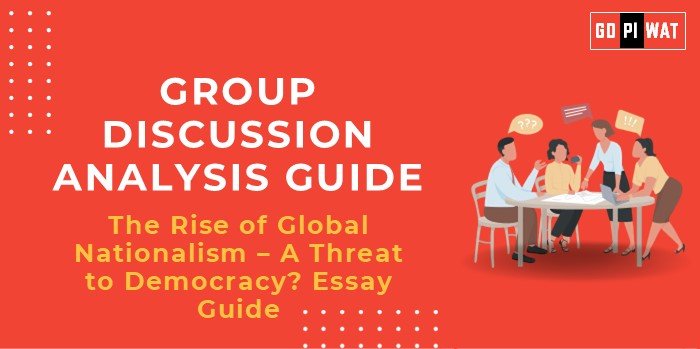📋 The Rise of Global Nationalism – A Threat to Democracy?
🌐 Understanding the Topic’s Importance
The resurgence of nationalism worldwide poses complex challenges to democratic governance. While nationalism can promote unity and a sense of identity, it often risks undermining pluralism, minority rights, and democratic checks and balances. For B-school students, this topic intersects with themes of global management, political risks, and ethical leadership.
📝 Effective Planning and Writing
- Time Allocation:
- ⏱️ Planning: 5 minutes
- ✍️ Writing: 20 minutes
- 🔍 Review: 5 minutes
- Preparation Tips: Research recent global examples, understand historical contexts, and be ready to balance both the pros and cons of nationalism’s influence on democracy.
📝 Introduction Techniques for Essays
- 🎭 Contrast Approach: “While nationalism fosters pride and unifies citizens around a common identity, it frequently challenges democratic norms, undermining civil liberties and minority rights in its path.”
- 💡 Solution-Based Approach: “Reconciling nationalism with democratic values requires robust institutions, inclusive policymaking, and adherence to pluralistic norms to prevent societal divides.”
- 📜 Historical Reference: “From early 20th-century Europe to contemporary populist movements, nationalism’s relationship with democracy has been both dynamic and fraught with tension.”
📊 Structuring the Essay Body
Achievements of Nationalism
- 🏅 Fostering National Unity and Pride: Nationalism can instill a sense of belonging among citizens, strengthening social cohesion. For example, post-Brexit Britain’s attempts to revive sovereignty reflect how nationalism can unify public sentiment.
- 📜 Policy Sovereignty and Self-Determination: Nationalist movements often emphasize reclaiming control over national policies. Brexit serves as a prime example, with the UK leaving the EU to pursue independent policies on trade, immigration, and governance.
- 💰 Economic Protectionism: Nationalist agendas sometimes lead to policies that protect domestic industries and jobs from global competition, as seen in the U.S. under recent nationalist administrations.
⚠️ Challenges of Nationalism on Democracy
- ⚖️ Erosion of Democratic Institutions: Nationalist leaders may centralize power, weaken checks and balances, and suppress opposition voices. Hungary’s Viktor Orbán exemplifies the trend of “illiberal democracy.”
- 💔 Xenophobia and Polarization: Nationalism can deepen societal divides, often leading to discrimination against minority groups. India’s policies under a nationalist agenda have raised concerns about religious discrimination and inclusivity.
- 🌍 International Isolation and Strained Diplomacy: Nationalist policies can reduce global cooperation and foster isolationism. Examples include protectionist trade wars and withdrawal from international agreements.
🔍 Global Comparisons
- 🌎 Multicultural Democracies vs. Nationalist Trends: Countries like Canada embrace multiculturalism and pluralism, presenting a stark contrast to nationalist policies that prioritize a single identity or culture.
- 📚 Historical Examples: The rise of nationalism in Europe during the 1930s illustrates the dangers of unchecked nationalist fervor undermining democratic institutions.
🔮 Future Outlook
- ⚖️ Harmonizing Nationalism and Democracy: Ensuring that nationalist sentiments do not erode democratic norms requires a commitment to inclusivity, protection of minority rights, and strengthening democratic institutions.
- 🌐 Global Cooperation Models: Countries must find ways to reconcile nationalism with international obligations, fostering a balance between national pride and global responsibility.
📝 Concluding Effectively
- ⚖️ Balanced Perspective: “Nationalism can offer pride and unity, but its unchecked growth poses significant threats to democratic norms, demanding robust institutions and inclusive policies to maintain balance.”
- 🌐 Global Comparison Conclusion: “Countries that strike a balance between nationalism and democracy, like Canada with its multicultural model, offer pathways for preserving unity while upholding pluralism.”
📈 Analyzing Successes and Shortcomings
- Key Achievements: National unity, cultural pride, policy sovereignty.
- Ongoing Challenges: Erosion of democratic norms, societal polarization, and weakened international cooperation.
- Global Context: Contrast between nationalist states and multicultural democracies highlights potential pathways and pitfalls.
🔍 Recommendations for Sustainable Progress
- 🤝 Inclusive Nationalism: Promote policies that emphasize national pride without alienating minorities or dissenting voices.
- ⚖️ Strengthened Democratic Institutions: Ensure a robust judiciary and free press to hold nationalist leaders accountable.
- 🌐 Dialogue and Cooperation: Foster international collaboration to address shared challenges while maintaining national sovereignty.
📝 Sample Short Essays (100 Words)
Balanced Approach:
“Nationalism’s resurgence worldwide has sparked debates about its impact on democratic norms. While it can foster unity and pride, unchecked nationalism often erodes democratic institutions, limits minority rights, and strains international cooperation. Balancing national sovereignty with pluralism is key to preserving democracy.”
Solution-Oriented:
“To harmonize nationalism with democratic principles, robust institutions, inclusive policies, and protection of civil liberties are essential. Countries must foster dialogue and preserve minority rights to prevent societal divides while ensuring that national pride does not compromise democratic norms.”
Global Comparison:
“While nationalism rises globally, Canada’s multicultural democracy presents a contrasting model that upholds pluralism and inclusivity. Nations grappling with nationalism’s challenges must learn from such models to preserve democratic norms while maintaining unity.”


